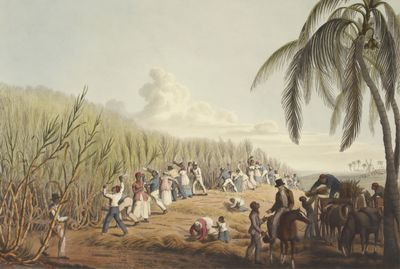By Qasim Swati (United Kingdom)
Slavery is the practice or system of owning slaves (especially in the past, a person who is the legal property of another and is forced to obey them). Dating back as far as 3500 BC, slavery is an ancient practice that operated even in the first civilizations, like Sumer, emerging during the Chalcolithic and early Bronze Ages between the sixth and fifth millennium BC in the historical region of southern Mesopotamia. Existing in almost every ancient civilization, slavery was very common in the past that could be found in different forms, while covering many religions, regions, nationalities, cultures and ethnicities, depending on legal, economic, social and other positions of the slaves.
Some people may point a finger at the British Empire for allowing and promoting slavery in the world, when this comes to Britain’s involvement in the slave trade in the 1700s. However, Britain was not the only power that profited from slavery in the past, because there is a big list of empires and countries that have played a significant role in founding and flourishing the global slave trade in various parts of the world, including Portugal, Spain, France, the Netherlands/Holland, some of West African Kingdoms and the Muslim world, among others.
Nevertheless, it was the British Empire that played a prominent role in the abolition of slavery by taking the initiative to put an end to the international slave trade in 1807. To fight against the practice of slavery, Britain outlawed the slave trade all over its overseas territories in 1833.
The United Kingdom not only made efforts to abolish slavery itself, but it started to pressure other countries for doing so as well. After the establishment of the West African Squadron by the British Royal Navy in 1808 for suppressing the Atlantic slave trade by patrolling the coast of West Africa in order to make it difficult or impossible for British ships to transport slaves, the United Kingdom negotiated treaties with other nations for permitting the British Royal Navy to obstruct or stop and search their ships for slaves, too.
To end the slave trade in different regions of the world, the British Empire used the vast resources available for its navy and made it, almost, impossible for slavers to continue their heinous and atrocious practice of enslaving people by carrying slaves to numerous colonies in the Americas. Consequently, Britain managed to free an estimated 150,000 slaves, just with the help of its West African Squadron, as referred to earlier.
While combating the slave trade, Britain took several steps for abolishing slavery in various forms, like the Slave Trade Act, 1807 (An Act for the Abolition of the Slave Trade) in the British Empire, the Slavery Abolition Act, 1833 (in order to put an end to slavery in most parts of the British Empire) and the formation of Anti-Slavery International (formed as the British and Foreign Anti-Slavery Society in 1839), which is the world’s oldest international human rights organization, too.
Besides other former British colonies, the United Kingdom did away with slavery in both Muslim and Hindu India by passing the Indian Slavery Act, 1843, also known as Act V of 1843.
Britain also played a notable role in eliminating the slave trade in Africa by signing anti-slavery treaties with more than 50 African rulers and other influential people in the continent. Even the United Kingdom used to take action against those African leaders who were unwilling and did not want to make the slave trade illegal in their countries.
As a result of the efforts made by the British Empire for terminating or getting rid of slavery, Britain and her allies were able to eliminate slave trade completely by 1888 in many parts of the globe and, eventually, outlawed the practice of slavery all over the world in 1948.
Qasim Swati is a freelance journalist, writer and human rights activist, based in the UK, and can be reached at https://qasimswati.com or qasimswati2003@yahoo.co.uk.

